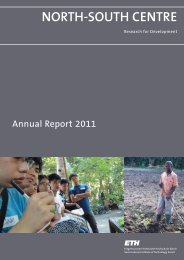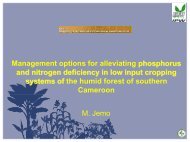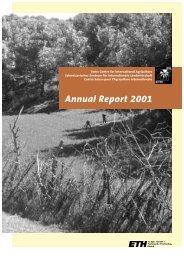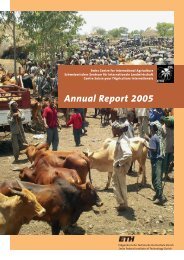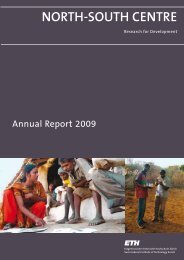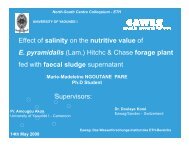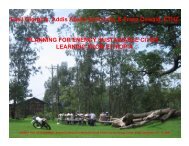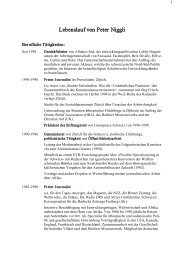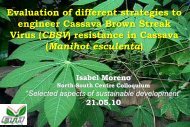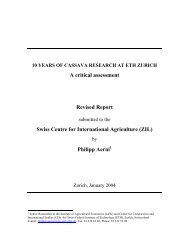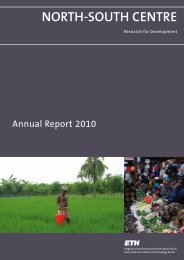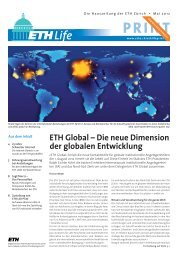ZIL research projectsLivestocksystemsresearchFeeding strategiesFood quality and public healthZIL research project, Phase VProject leadersMichael Kreuzer, Andrea MayerContact personAndrea MayerCollaboratorsLuis Iñíguez, Barbara Rischkowsky, SafouhRihawi, Muhi El-Dine Hilali, Aden Aw-Hassan,Asamoah Larbi, ICARDA, Syria / ChristopheLacroix, Bernard Lehmann, Martin Scheeder,<strong>ETH</strong> Zurich / Hans-Dieter Hess, ALPDurationOctober 2003 – May 20<strong>07</strong>Improving small ruminant productivity in dry areasthrough cost-efficient animal nutrition and improvedquality of milk and dairy productsIn dry areas, small ruminant production contributes substantiallyto the livelihood of small-scale and resource-poor farmers.A common limiting factor to all arid regions is feed scarcity.Farmers try to include non-conventional feeds, e.g.by-products of the food industry, and attempt to integratecropping and livestock activity, e.g. by making use of cropresidues. This ZIL project develops new, participatory andWoman milking Awassi sheep in the El-Bab region of SyriaAwassi sheep feeding on olive branches, which were collected bylivestock farmers for their animals after olive tree pruning in Autumnmarket-oriented approaches to improve resource use efficiencyand productivity and profitability of small ruminantproduction systems, in particular fat-tailed Awassi sheep, indry areas by more cost-efficient feeding, enhanced milk quality,and increased farmers’ income.In order to get an overview on the feeds actually used by thefarmers, feed markets were visited in Autumn <strong>2006</strong> and asurvey was conducted with 30 farmers in the El-Bab region ofSyria. A master student will analyse the importance of qualityissues in the market chain of dairy products. In Octoberand November 20<strong>07</strong>, two digestibility experiments will becarried out at ICARDA, Syria, in order to assess intake,digestibility and nitrogen balance of eight diets (olive leaves,lentil straw, vetch hay and Atriplex halimus leaves as foragetypefeeds, and olive cake, tomato pulp, molasses/sugar beetpulp and broken lentil as concentrate-type feeds) comparedto a traditional control diet. In order to assess the influenceof the different feeds on the whole system, the effect of thefaeces of the experimental animals on certain soil propertieswill be tested in an additional soil experiment. Based on theresults of the digestibility experiment, five diets will beselected for a subsequent feeding experiment with Awassiewes in order to determine the response in milk productionand milk and dairy product quality (e.g. cheese and yogurtquality). In an on-farm experiment, two of the best dietsidentified based on the ewes experiment will be tested onfarmin close collaboration with farmers. Applying Life CycleAssessment (LCA), the ecological sustainability of certainfeeding options will be tested.38
ZIL research project, Phase VProject leadersChristophe Lacroix / Leo MeileContact personsZakaria Farah, Christoph Jans, <strong>ETH</strong>Zurich / Murigu P. Kamau,Muhura Dasel, Univ. of Nairobi, KenyaCollaboratorsJakob Zinsstag, Swiss Tropical Institute,Basel / John Wangoh, Institute of FoodTechnology and Nutrition, Universityof Nairobi, KenyaDurationJune 20<strong>07</strong> – June 2010ZIL research projectsLivestocksystemsresearchFood quality and public healthCamel milk products of high hygienic quality and safety,for increased income and reduced health risks in KenyaIn Kenya, camels play a central role as milk suppliers. Due tothe advancing urbanisation, camel milk is increasingly commercialisedand consumed in urban areas mainly in the formof fermented milk products. There are important publichealth concerns regarding the risk of commercialised camelmilk. In addition, there are considerable losses caused byfrequent spoilage due to the absence of appropriate conservationmethods.wastage and generation of additional income for the farmersand processors; (iii) regionally, the improved technologieswill offer possibilities for direct adaptation in other similarproduction and market systems in many parts of the continent.The project partners are the Department of Food Technologyand Nutrition at the University of Nairobi and the KenyanCamel Association.The overall objective of the project is to increase the addedvalue of camel milk through development of market-orientedfermented milk products of high quality and prolonged shelflife, creating income and improving (in the long term) thestandard of living in the region.This objective will be achieved through: (i) better knowledgeon the diversity of beneficial and pathogenic microorganismsof traditional fermented products, development of newstarter cultures and controlled fermentation processes fornew marketable camel milk products, all based on modernfood biotechnology and advanced microbiological methods;(ii) studies of the hygienic quality of camel milk on productionand marketing levels, and introduction of simpletechniques to improve the hygiene status on all levels. Theproject is being carried out by two doctoral students (Swissand Kenyan) and one Kenyan MSc student. The first milksample collection in Kenya was started in June 20<strong>07</strong> togetherwith analyses carried out by the <strong>ETH</strong> student.One of the camel herds used for milk sample collection in Nanyuki, KenyaMilking camels: Milk samples are collected directly from the udderThe expected outputs are: (i) improved production processesand new product development; (ii) improved processing andhandling technologies impacting public health, reduced food39
- Page 1 and 2: Swiss Centre for International Agri
- Page 3 and 4: Table of contentsZIL members. . . .
- Page 5 and 6: EditorialThe present Annual Report
- Page 7 and 8: An introduction to ZILThe ZIL proje
- Page 9 and 10: An introduction to ZILThe Progress
- Page 11 and 12: An introduction to ZILOn September
- Page 13 and 14: An introduction to ZILIn 2007, the
- Page 15: An introduction to ZILThe ZIL Execu
- Page 18 and 19: Impact StudyThe development impact
- Page 20 and 21: Impact Study18market opportunities
- Page 22 and 23: Impact Study20ral (N), human (H), f
- Page 24 and 25: ERA-ARDThe European Research Area i
- Page 26 and 27: ZIL research projectsOverviewLivest
- Page 28 and 29: ZIL research projectsIntegratedPest
- Page 30 and 31: ZIL research projectsEcosystemservi
- Page 32 and 33: ZIL research projectsLivestocksyste
- Page 34 and 35: ZIL research projectsLivestocksyste
- Page 36 and 37: ZIL research projectsLivestocksyste
- Page 38 and 39: ZIL research projectsLivestocksyste
- Page 42 and 43: ZIL research projectsLivestocksyste
- Page 44 and 45: Research Fellow Partnership Program
- Page 46 and 47: Research Fellow Partnership Program
- Page 48 and 49: Research Fellow Partnership Program
- Page 50 and 51: Research Fellow Partnership Program
- Page 52 and 53: Research Fellow Partnership Program
- Page 54 and 55: Research Fellow Partnership Program
- Page 56 and 57: Research Fellow Partnership Program
- Page 58 and 59: Research Fellow Partnership Program
- Page 60 and 61: Research Fellow Partnership Program
- Page 62 and 63: Research Fellow Partnership Program
- Page 64 and 65: Seed MoneySeed Money Projects 2003-
- Page 66 and 67: Other international projects of ZIL
- Page 68 and 69: Teaching activities related to deve
- Page 70 and 71: Development-related thesesSupervisi
- Page 72 and 73: Development-related thesesSuperviso
- Page 74 and 75: PublicationsPublications72Refereed
- Page 76 and 77: PublicationsMathayya, S., Thankacha
- Page 78 and 79: PublicationsVariaZIL funded project
- Page 80 and 81: PublicationsRFPP projectsAbang, M.,
- Page 82 and 83: PublicationsStupak, M., Alder, A.,
- Page 84 and 85: PublicationsStickstoffumsatz und di
- Page 86 and 87: PublicationsOther international pro
- Page 88 and 89: Publicationssubandinen Waldweide-Sy
- Page 90 and 91:
ZIL members, collaborators and part
- Page 92 and 93:
ZIL members, collaborators and part
- Page 94 and 95:
AccountsAccounts 2006*Balance, Dece
- Page 96:
Swiss Centre for International Agri




